Why Does My Washing Machine Smell? 4 Likely Reasons
-
Pete Ortiz
- Last updated:
If you are in your laundry room and you smell rotten eggs, the smell may or may not be coming from your washing machine. The smell of rotten eggs can be a buildup of dirt and grime that is releasing hydrogen sulfide gas, or you may have a gas leak or a sewer issue.
Once you have confirmed that the smell is not from a gas leak or a sewer problem, it may be a common issue like trapped clothing or a buildup of dirt and residue.
Here are four reasons you may have a smelly washing machine.
The 4 Reasons Why Your Washing Machine Smells
1. Something Is in the Door Seal (Front-Loading Washers)
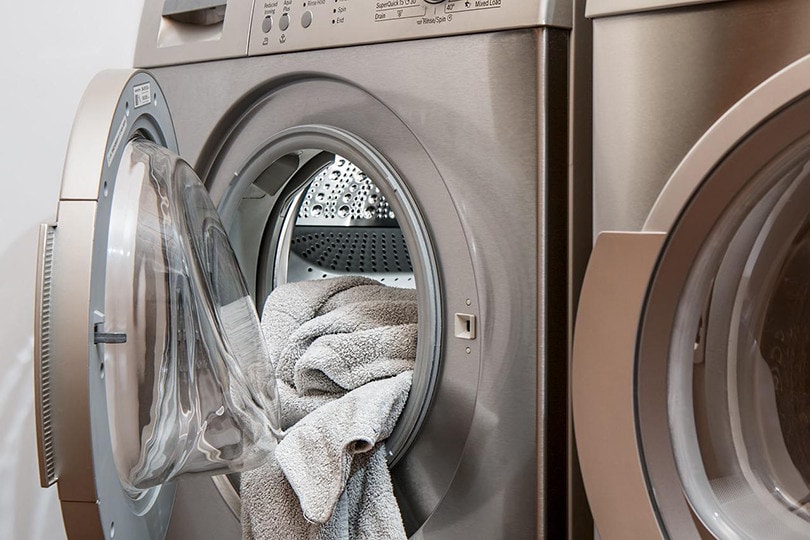
It is common for front-loaders to get a small piece of clothing or a sock stuck in the rubber door seal of the washer. If it has gone unnoticed for a long time, it can get covered in mildew. Over time, it can begin to smell like rotten eggs.
To resolve this issue, check the door seal to be sure there aren’t any items stuck in the gasket of the door.
2. The Drain Plug or Pump Is Clogged (Front-Loading Washers)
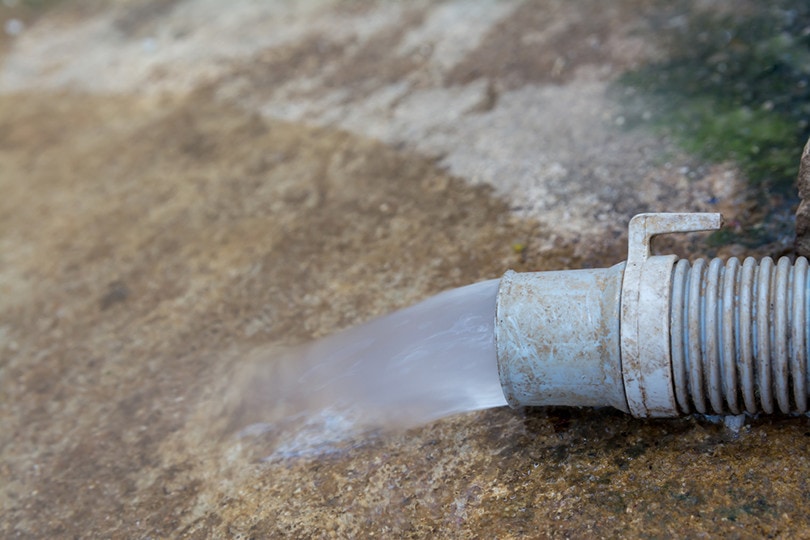
Front-loading washers have a drain plug in the bottom of the machine. Depending on the model, the drain plug can be located on the back, the sides, or in the front of the machine. The smell can be coming from a clogged drain plug or pump.
Clearing any clogs in the drain plug or pump should resolve the issue. If not, run the machine through a cycle and check for any issues with the sewer.
3. Potential Plumbing Issue
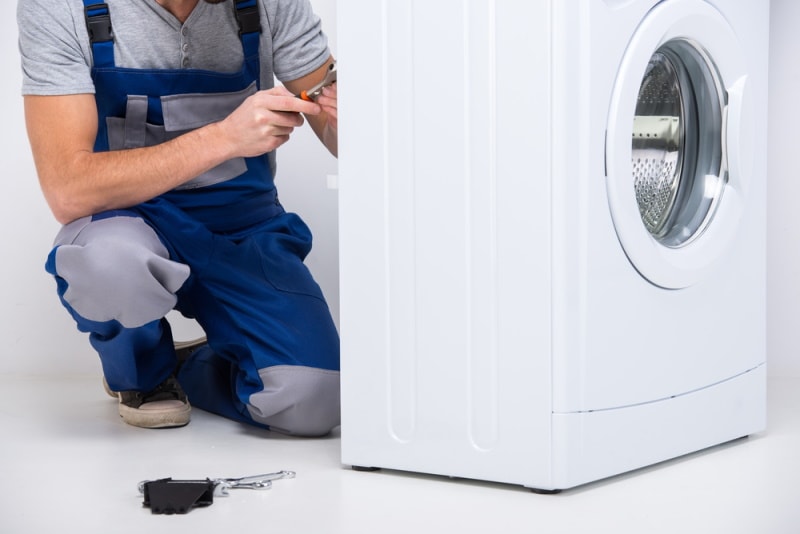
If you are smelling a human waste or sewer type of smell, it can be a plumbing issue that allows sewer gas into your laundry room. It may also be a bacteria buildup in the washer, causing the funky odor. When a washing machine gets grimy, the bacteria release hydrogen sulfide gas that smells like sewer.
Since a plumbing issue can be dangerous, you should rule that out first. If you are handy, you can check for clogs in the drainpipe, P-trap, and washer vent pipe yourself. If you are unable to check these issues yourself or the source of the smell is from a clog that is allowing sewer gas into your home, call a professional right away to have the problem fixed.
4. Mold or Mildew
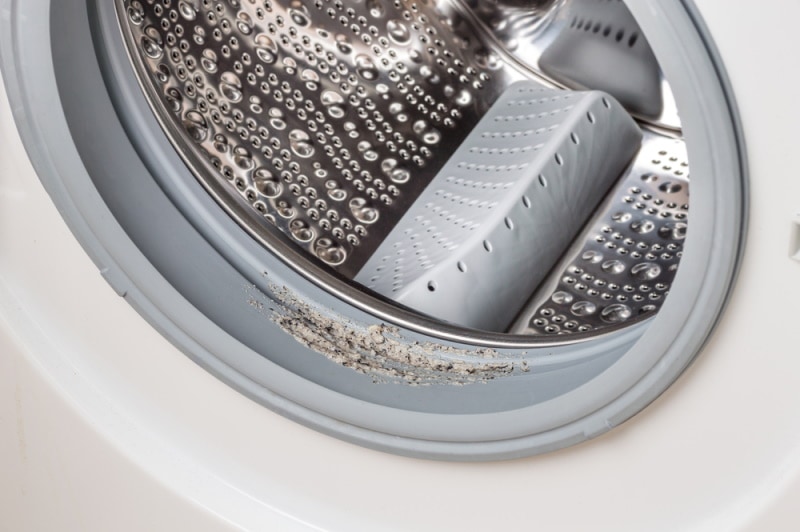
If the plumbing and gas supply issues have been checked and ruled out, the smell can be from mold and mildew in the washing machine. This is a common problem with washers, especially high-efficiency models and front-loaders.
Washing machines are the perfect environment for mold, mildew, and bacteria. Washing machines combine residue from detergent and fabric softener with heat and moisture. The lack of airflow, combined with the residue, will cause an odor in your machine.
If you do not have a front-loading washing machine and you have ruled out any gas leaks or sewer problems, your washer may require a good deep cleaning to get rid of the unpleasant smell.
How to Remove Odors From a Washing Machine
1. Heat
If you are washing items that require cold water, the last cycle for the day should be done with hot water. This will help to remove any residue from dirt or detergent that can build up in your washing machine over time.
2. Use the Recommended Laundry Products
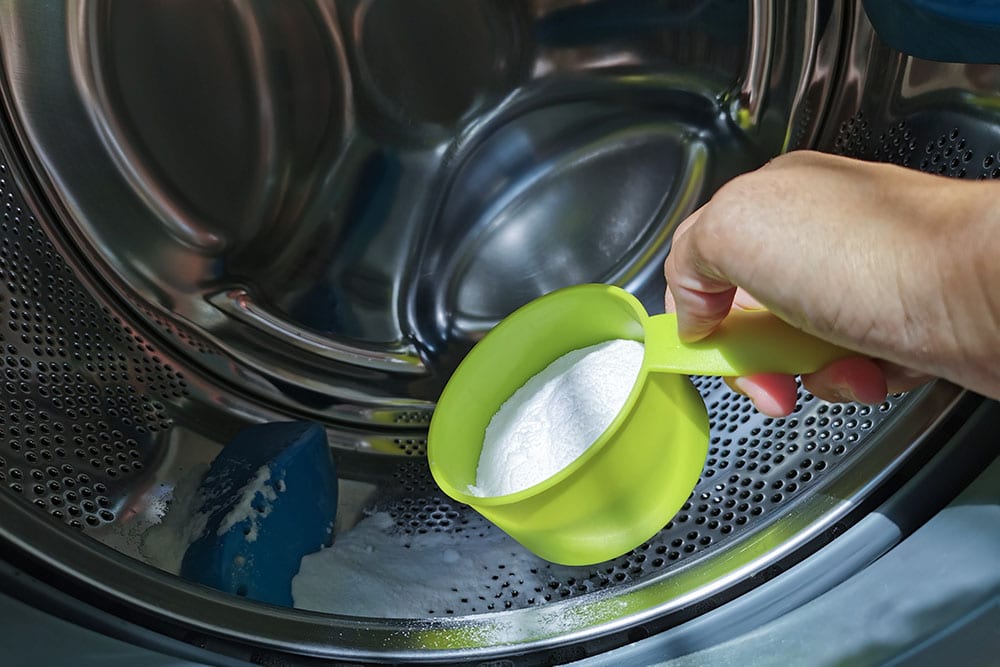
Always use the recommended laundry products for your washing machine. It is especially important for front-loading machines. Some of these units need special products, like high-efficiency detergents that leave less film behind after washing a load of laundry.
3. Increase Circulation
After washing and removing a load of laundry, you should leave the door to the machine open. This will provide airflow in the interior of the washer and allow the inside of the machine to dry. The drying process can be expedited with an installed dehumidifier or exhaust fan in your laundry room. Although it is not necessary, it would provide added protection if you do not have adequate air circulation and it is within your budget.
4. Clean Your Washing Machine
It is important to maintain the cleanliness of your washer regularly. Here are some products that are excellent for cleaning your washing machine.
- Vinegar: Add two cups of vinegar to the soap dispenser in your washing machine and run it on the hottest cycle.
- Baking Soda: Put a quarter of a cup of baking soda in the soap dispenser cup and run it on the hottest cycle.
- Baking Soda and Vinegar: You can combine a quarter of a cup of baking soda along with two cups of white vinegar. Put the mixture in the soap dispenser and run the washer on the hot cycle.
- Commercial Cleaning Products: There are cleaning products on the market that will clean your washer when added to a load of laundry. The action of cleaning the laundry, along with the higher water level, aids in cleaning the washer.
- Clean the Rubber Seal: It is common for mold and mildew to grow inside the rubber seal of the washer door. Use a mild detergent or a mixture of vinegar and water and a sponge to clean the gasket of the washer door. Once it has been cleaned, dry the gasket, and leave the door open. This will allow the air to circulate and any moisture to dissipate.
In Conclusion
You would think that with all the detergent and cleaning inside of a washing machine, it would naturally be clean and odor-free. That is not the case, however. Washing machines, like other appliances, need regular cleaning and maintenance to run efficiently and stay free of bacteria and other things that can cause them to smell.
Featured Image Credit: Pixel-Shot, Shutterstock
Contents



